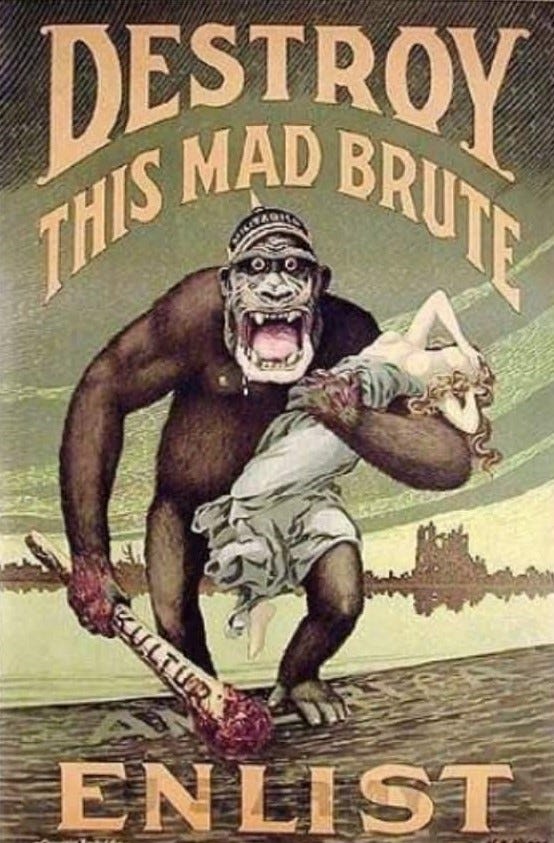The Dangers of Demonizing Opponents
"Tribalism is humankind's most dangerous instinct"
"For most human beings, it takes an awful lot to allow them to kill another human being. The only way to do it is to justify the killing, to make the enemy look as evil as possible."-- psychology professor Anthony Pratkanis
"The secret in propaganda is that when you demonize, you dehumanize."-- mass communications professor James Forsher
A product of tribalism and cognitive biases, the demonizing and dehumanizing of political and ideological foes are as old as human history. During religious, political and social sectarianism, opponents have been depicted not merely as wrong but immoral, contemptible, and even less than human. Characterizing the enemy as non-human animals and monsters is a common tool of war and politics. Social philosopher Eric Hoffer wrote, “Mass movements can rise and spread without belief in a god, but never without a belief in a devil.”
Psychologist Camilo Zacchia believes that tribalism is humankind’s most dangerous instinct.
While the demonizing of opponents is age-old, there has been an increase in recent years. Widespread polarization is on the rise in the United States, with Republican and Democratic members’ hatred of each other at a 40-year high. Americans are more willing to support violence against opponents and are less open to relationships that go across party lines.
A 2020 Scientific American report noted that many Americans have “a basic abhorrence for their opponents—an ‘othering’ in which a group conceives of its rivals as wholly alien in every way. This toxic form of polarization has fundamentally altered political discourse, public civility, and even the way politicians govern.” In her New York Times column “America Has a Scorn Problem,” Anglican priest Trish Warren Harrison wrote, “We find one another repugnant—not just wrong but bad. Our rhetoric casts the arguments of others as profound moral failings.”
Tribalism and irrational biases against groups are innate to human psychology, and no one is entirely free of prejudice against other groups. While a Portland progressive may publicly call out Southern rural conservatives for their irrational prejudices against big city people and ethnic minorities, this progressive may have false and derogatory stereotypes about rural Southerners, the religious or conservatives.
Much of the recent increase in tribalism and demonization is due to human behavior. It is also influenced by trends in online news and social media. Facebook, Twitter and Youtube are designed to amplify angry and polarizing content and put people into echo chambers. Echo chambers create distorted views of the world, false perceptions of others, self-righteousness and bigotry. I’ve seen echo chambers so narrow within the Right and Left that their members demonize and smear members of their own party.
The following are some problems with this demonizing of opponents.
It’s wrong. Simple as that. It shouldn’t have to be explained to someone that defaming, lying about and falsely stereotyping other people is wrong.
It’s false. It’s a false portrayal of people. It creates a false, conspiracy theory view of the world. Most of us learned from our families bigoted views of groups only to learn as we grew up how false are these stereotypes.
It is anti-intellectual. It closes minds. Logical fallacies, including ad hominem attacks, have no place in honest discourse. Yet many extreme partisans and true believers have said they won’t even listen to people with opposing views, and support the censorship of opponents. There are intelligent, learned and insightful people all along the political and ideological spectrum, and it is your loss not to listen to them.
It is a danger to society. People who demonize others are more likely to believe their opponents don’t deserve the same rights, including due process, freedom of speech, and democratic rights. Polls have shown that those who demonize their opponents are more likely to support undermining democratic processes to punish their opponents, unfair court punishment of their opponents, censorship, and even violence. Extreme partisans are more likely to believe the ends justify the means, even when the means include cheating and other unethical behavior.
History has shown us what the “othering” of opponents can lead to.
Alexander Landry, a Stanford University expert on the psychology of intergroup conflict and violence, writes in the essay Dehumanization is Threatening Democracy, “Growing animosity between the political parties, rising support for anti-democratic norms, and outbursts of partisan violence threaten the social fabric of our nation. “
Get out of the habit of unfairly and inaccurately demonizing others, and call out when your friends demonize others. Work to identify your own blindspots and irrational prejudices about others. Avoid echo chambers and work to really listen to and understand others. Promote environments where viewpoint diversity and sincere listening to others’ views are championed.
.
Related posts:




As always, right on target.